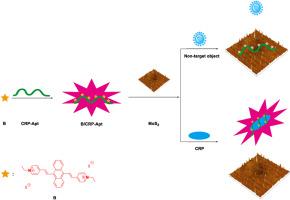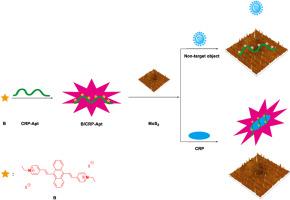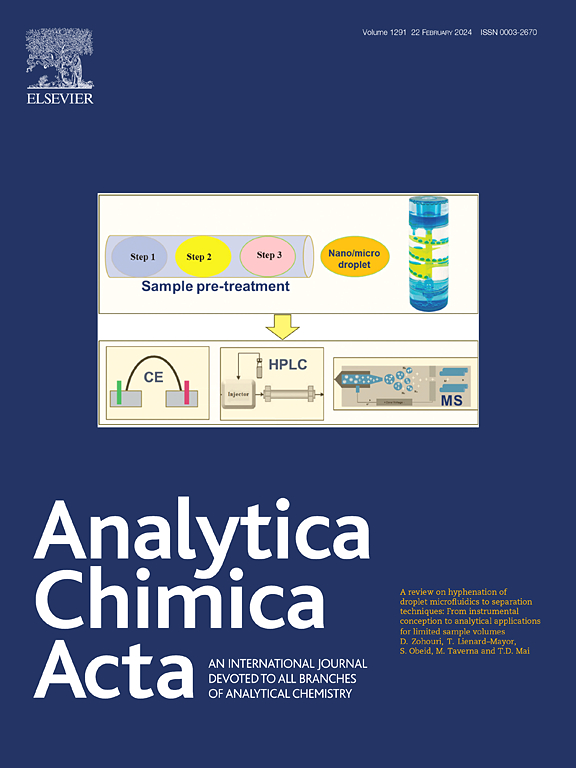Detection of C-reactive protein using a label-free NIR fluorescent aptasensor with a large Stokes shift based on an AIEE anthracene derivative
IF 5.7
2区 化学
Q1 CHEMISTRY, ANALYTICAL
引用次数: 0
Abstract
Background
C-reactive protein (CRP), one of the classic biomarkers of inflammation, is closely related to infectious inflammation, cardiovascular disease, cancer, and other diseases. Therefore, timely and accurate detection of CRP in human blood is crucial for the discovery, diagnosis, and treatment of the aforementioned diseases. Herein, a novel label-free NIR fluorescence aptasensor with a large Stokes shift based on an AIEE anthracene derivative B and a molybdenum disulfide (MoS2) platform was developed and used for the high sensitivity and specificity detection of CRP.
Results
Compound B could emit near-infrared (NIR) fluorescence with a large Stokes shift (190 nm). Notably, this compound could bind with the aptamer of CRP (CRP-Apt) through electrostatic attraction to form a B/CRP-Apt complex, generating an aggregation-induced emission enhancement effect and enhancing the fluorescent intensity of B. B/CRP-Apt could be adsorbed on the surface of MoS2 with the addition of MoS2 to its solution, and the fluorescence of Compound B was quenched. CRP was then added to the above solution. CRP-Apt had a substantially higher affinity for CRP than MoS2. Therefore, B/CRP-Apt detached from the surface of MoS2 and bound to CRP, thereby restoring the fluorescence of B. Experimental results showed a good linear relationship between the fluorescent recovery intensity of B and the concentration of CRP in the concentration range of 0.3–70 ng mL−1, with a limit of detection as low as 0.1 ng mL−1.
Significance and novelty
The aptasensor integrates the advantages of high sensitivity of NIR fluorescence, high specificity of aptamers, good water-solubility and AIEE effect of Compound B. And it could be applied to the determination of CRP in human serum samples, while most of the reported methods can only determine CRP in spiked human serum samples.


使用基于 AIEE 蒽衍生物的具有大斯托克斯偏移的无标记近红外荧光传感器检测 C 反应蛋白
背景C反应蛋白(CRP)是炎症的经典生物标志物之一,与感染性炎症、心血管疾病、癌症等疾病密切相关。因此,及时准确地检测人体血液中的 CRP 对上述疾病的发现、诊断和治疗至关重要。本文以 AIEE蒽衍生物 B 和二硫化钼(MoS2)平台为基础,开发了一种具有大斯托克斯位移的新型无标记近红外荧光诱导传感器,并将其用于 CRP 的高灵敏度和特异性检测。值得注意的是,该化合物能通过静电吸引与 CRP 的适配体(CRP-Apt)结合,形成 B/CRP-Apt 复合物,产生聚集诱导的发射增强效应,增强 B 的荧光强度。然后向上述溶液中加入 CRP。CRP-Apt 对 CRP 的亲和力大大高于 MoS2。实验结果表明,在 0.3-70 纳克毫升-1 的浓度范围内,B 的荧光恢复强度与 CRP 的浓度呈良好的线性关系,检测限低至 0.1 纳克毫升-1。该适配传感器综合了近红外荧光的高灵敏度、适配体的高特异性、化合物 B 良好的水溶性和 AIEE 效应等优点,可用于测定人血清样本中的 CRP,而目前报道的大多数方法只能测定加标人血清样本中的 CRP。
本文章由计算机程序翻译,如有差异,请以英文原文为准。
求助全文
约1分钟内获得全文
求助全文
来源期刊

Analytica Chimica Acta
化学-分析化学
CiteScore
10.40
自引率
6.50%
发文量
1081
审稿时长
38 days
期刊介绍:
Analytica Chimica Acta has an open access mirror journal Analytica Chimica Acta: X, sharing the same aims and scope, editorial team, submission system and rigorous peer review.
Analytica Chimica Acta provides a forum for the rapid publication of original research, and critical, comprehensive reviews dealing with all aspects of fundamental and applied modern analytical chemistry. The journal welcomes the submission of research papers which report studies concerning the development of new and significant analytical methodologies. In determining the suitability of submitted articles for publication, particular scrutiny will be placed on the degree of novelty and impact of the research and the extent to which it adds to the existing body of knowledge in analytical chemistry.
 求助内容:
求助内容: 应助结果提醒方式:
应助结果提醒方式:


